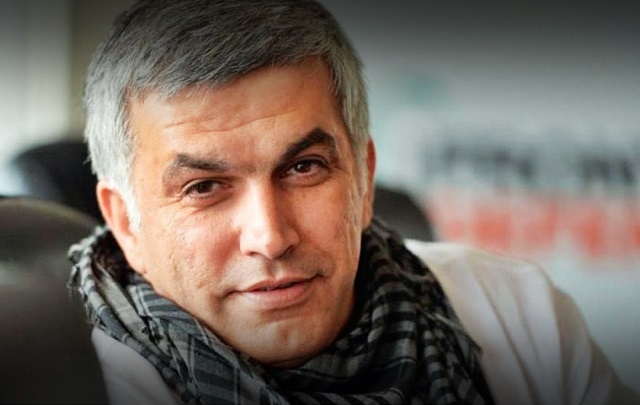21 May 2018 – On Sunday, 20 May 2018, Bahrain’s High Court of Appeal adjourned until 5 June to issue its ruling on whether to uphold the five-year prison sentence against human rights defender Nabeel Rajab on charges that patently violate his right to free expression. Rajab is currently serving a total of seven years in prison in reprisal for his activism, and his health has deteriorated under poor detention conditions. Americans for Democracy & Human Rights in Bahrain (ADHRB) reaffirms our unequivocal condemnation of the government’s clear and continued retaliation against Rajab for his peaceful human rights work and calls for his immediate release.
Rajab is currently appealing his February 2018 conviction on politically motivated charges of “spreading false rumors in time of war,” “insulting public authorities,” and “insulting a foreign country.” The accusations stem solely from tweets and retweets in which he called attention to torture in Bahrain’s prisons and criticized the war in Yemen. This sentence added to the two-year term he received on 10 July 2017 on charges of “publishing and disseminating rumors and false news” related to past television interviews wherein he discussed Bahrain’s restrictions on freedom of the press. Rajab also appealed that decision, but the ruling was twice upheld, with a final 15 January 2018 confirmation from the Court of Cassation. He was originally arrested ahead of these trials on 13 June 2016.
In addition to the two- and five-year sentences, ADHRB has learned that Rajab could also face further prison time for at least 14 other outstanding cases the government is reportedly maintaining against him. Though the details of these cases are as yet unclear, the authorities have already threatened to charge Rajab with additional counts of “spreading false news and statements and malicious rumors that undermine the prestige of the state” in relation to letters published in The New York Times and Le Monde. Furthermore, on 12 September 2017, the government charged him with “spreading false news,” “inciting hatred against the regime,” and “inciting non-compliance with the law” over social media posts published on his Twitter and Instagram accounts while he was already in police custody in January 2017. These cases could be sent to trial at any time.
Rajab is serving his sentences in Jau Prison, the kingdom’s primary long-term male detention center notorious for abuse and poor living standards. In April 2018, Rajab’s family reported that the authorities denied him and other inmates access to water for more than a day and a half, and that they only relented after another detainee fainted from dehydration. His family has since reported that Rajab remains confined to his cell for 23 hours or more every day, and that the authorities prevent him from reading books and writing. When Rajab was first transferred to Jau Prison in October 2017, the guards subjected him to degrading treatment, including forcibly shaving his hair, arbitrarily raiding his cell at night, and confiscating his personal items. Guards continue to verbally harass him and his cellmates. Likewise, for much of the pre-trial detention period, Bahraini authorities held him in solitary confinement for months at a time in an unhygienic cell in East Riffa police station, violating Bahraini legal provisions meant to limit the use of isolation. He has suffered from severe skin infections and chronic gallstones, among other ailments, and the authorities denied him proper medical care. As a result, Rajab’s health deteriorated and he has been repeatedly hospitalized. The Bahrain Center for Human Rights (BCHR), the International Federation for Human Rights (FIDH), and the Gulf Center for Human Rights (GCHR) reported in January 2018 that the prison administration appeared to be purposefully interfering with Rajab’s ongoing medical treatment. Government doctors now say that he may require additional surgery that could have been avoided if he had received proper, consistent care.
The charges against Rajab inherently contravene the right to free expression, and the allegation of “spreading false rumors” is particularly baseless, as objective observers at the United Nations (UN) – including the High Commissioner for Human Rights, the Assistant Secretary-General for Human Rights, and the Committee Against Torture – have all documented the human rights abuses he raised in his interviews and social media posts. Moreover, since his arrest, the Assistant Secretary-General and the Committee Against Torture have specifically cited Rajab’s case amid other reports of arbitrary detention, torture, and reprisal in Bahrain.
The United States (US) Government has also consistently urged the Bahraini authorities to drop the charges against Rajab, and on 22 February 2018, the Department of State issued multiple calls for his release. The US Mission to the UN published a statement to Twitter indicating that the US was “disappointed” by the verdict, reiterating “previous calls for his release,” and emphasizing that “no one should be imprisoned for exercising their human rights and fundamental freedoms.” Following the statement, State Department Spokesperson Heather Nauert responded to a question on Rajab’s case by highlighting his broad international following and his message of non-violent rights activism, as well as criticizing his long sentence for peaceful criticism. Nauert also reiterated the previous calls for his release and urged Bahrain to respect its international obligations to protect free expression. Congressional leaders like Senator Ron Wyden (D-OR), Senator Marco Rubio (R-FL), and Representative Jim McGovern (D-MA) have also condemned the government’s harassment of Rajab and called for his freedom.
The Bahraini government’s imprisonment of Nabeel Rajab is a blatant violation of free expression and clear act of reprisal against a human rights defender. ADHRB calls on the Government of Bahrain to release Rajab once and drop all extant cases against him. Until he is free, we further call on the international community – particularly including the US State Department and Congress – to take concrete measures to pressure the Bahraini authorities for Rajab’s release, including the suspension or restriction of arms sales and security assistance.





